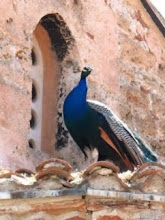Orkiestra Antyczna
Orkiestra Antyczna to projekt muzyczny i badawczy powołany w Ośrodku Praktyk Teatralnych Gardzienice przez Tomasza Rodowicza i Macieja Rychłego. Obejmuje on rekonstrukcję i opracowanie antycznej muzyki oraz instrumentów tamtego okresu.
Z rozśpiewanej i roztańczonej starożytnej Grecji pozostało kilkadziesiąt fragmentów muzycznych zapisanych na strzępach papirusów i potłuczonych kamiennych tablicach. Ocalały też rysunki grających postaci i instrumentów muzycznych: kitar, lir, harf, aulosów, bębnów, monochordu. Chcemy w tym projekcie na nowo usłyszeć te dźwięki, sprawdzić, co w nich dalekie, co bliskie.
Przedsięwzięcie to ma swoje źródło w pracy M. Rychłego z zespołem Gardzienic nad muzyką do spektaklu "Metamorfozy" wg Apulejusza. Tamten etap muzycznej pracy zarejestrowaliśmy na płycie Gardzienice Metamorfozy - Music of Ancient Greece (2000 Altmaster i przyjaciele). Wtedy stało się dla nas jasne, że jest to dopiero początek przygody, której dziś nadaliśmy nazwę Orkiestra Antyczna.
Tyle oficjalnej notki Orkiestry Antycznej.
Z rozśpiewanej i roztańczonej starożytnej Grecji pozostało kilkadziesiąt fragmentów muzycznych zapisanych na strzępach papirusów i potłuczonych kamiennych tablicach. Ocalały też rysunki grających postaci i instrumentów muzycznych: kitar, lir, harf, aulosów, bębnów, monochordu. Chcemy w tym projekcie na nowo usłyszeć te dźwięki, sprawdzić, co w nich dalekie, co bliskie.
Przedsięwzięcie to ma swoje źródło w pracy M. Rychłego z zespołem Gardzienic nad muzyką do spektaklu "Metamorfozy" wg Apulejusza. Tamten etap muzycznej pracy zarejestrowaliśmy na płycie Gardzienice Metamorfozy - Music of Ancient Greece (2000 Altmaster i przyjaciele). Wtedy stało się dla nas jasne, że jest to dopiero początek przygody, której dziś nadaliśmy nazwę Orkiestra Antyczna.
Tyle oficjalnej notki Orkiestry Antycznej.
Skład:
Ania Dąbrowska, Dagmara Nakonieczna, Pola Matuszewska, Beata Oleszek, Katarzyna Tadeusz, Elina Toneva, Agnieszka Szablewska, Maciej Rychły, Tomasz Rodowicz, Sean Palmer, Maciej Maciaszek, Paweł Passini, Grzegorz Pawłowski, Tomek Krzyżanowski, Piotr Furtak
Ania Dąbrowska, Dagmara Nakonieczna, Pola Matuszewska, Beata Oleszek, Katarzyna Tadeusz, Elina Toneva, Agnieszka Szablewska, Maciej Rychły, Tomasz Rodowicz, Sean Palmer, Maciej Maciaszek, Paweł Passini, Grzegorz Pawłowski, Tomek Krzyżanowski, Piotr Furtak
THE ANCIENT ORCHESTRA
is an international artistic and research project initiated by Tomasz Rodowicz and Maciej Rychły within the Centre for Theatre Practices in Gardzienice in 2001. Since march 2004 Ancient Orchestra function in new Theatre Association CHOREA. The project is focusing on the oldest, practically unknown sources of European music.
This enterprise is a continuation of Maciej Rychły's works with the theatre ensemble of Gardzienice on the music for the staged production "Metamorphoses" according to Apuleius directed by Włodzimierz Staniewski (1995). Results of this early stage of musical works intended for atheatre spectacle was recorded and published on CD "Gardzienice Metamorfozy - Music of Ancient Greece". Yet there still remained much material unrealised, many questions, new ideas and fascinations; thus it became clear that it was but a beginning of a long-run work. The project is divided into several stages comprising research, reconstruction, arranging and performing the music of antique Greece and Rome as well as building copies of historical instruments.
The Orchestra's ensemble consists of 15 Polish and foreign singers and instrumentalists who have been meeting regularly for rehearsal sessions in Gardzienicesince September 2001. At present the ensemble works on 14 pieces arranged by Maciej Rychły who reconstructed them or composed basing on fragmentary antique sources. Thefinal shape and sound characteristics is an effect of the ensemble's common work during rehearsals. Advanced studies and research on antique instruments: phorminx, kithara, lyre, monochord, bucina, sistrum is carried on. Hhydraulis and aulos are about to be built. An average contemporary European Westerner usually recognises the Gregorian chant as origin of European music. The existing scores of antique pieces are known only to a small circle of specialists. There have been but a few attempts of presenting this music in a live performance. From the survived musical fragments as much as from sculpture, architecture and literature - we can read, sing and play lively songs, testifying to imagination, sensitivity and musical richness of antique composers, being at the same time poets and playwrights. Interpreting the antique music with a modern language we propose a hypothesis and invite to a dialogue and discussion on the musical heritage of Europe.
This enterprise is a continuation of Maciej Rychły's works with the theatre ensemble of Gardzienice on the music for the staged production "Metamorphoses" according to Apuleius directed by Włodzimierz Staniewski (1995). Results of this early stage of musical works intended for atheatre spectacle was recorded and published on CD "Gardzienice Metamorfozy - Music of Ancient Greece". Yet there still remained much material unrealised, many questions, new ideas and fascinations; thus it became clear that it was but a beginning of a long-run work. The project is divided into several stages comprising research, reconstruction, arranging and performing the music of antique Greece and Rome as well as building copies of historical instruments.
The Orchestra's ensemble consists of 15 Polish and foreign singers and instrumentalists who have been meeting regularly for rehearsal sessions in Gardzienicesince September 2001. At present the ensemble works on 14 pieces arranged by Maciej Rychły who reconstructed them or composed basing on fragmentary antique sources. Thefinal shape and sound characteristics is an effect of the ensemble's common work during rehearsals. Advanced studies and research on antique instruments: phorminx, kithara, lyre, monochord, bucina, sistrum is carried on. Hhydraulis and aulos are about to be built. An average contemporary European Westerner usually recognises the Gregorian chant as origin of European music. The existing scores of antique pieces are known only to a small circle of specialists. There have been but a few attempts of presenting this music in a live performance. From the survived musical fragments as much as from sculpture, architecture and literature - we can read, sing and play lively songs, testifying to imagination, sensitivity and musical richness of antique composers, being at the same time poets and playwrights. Interpreting the antique music with a modern language we propose a hypothesis and invite to a dialogue and discussion on the musical heritage of Europe.
link in comments



Komentarze (0):
Prześlij komentarz
Subskrybuj Komentarze do posta [Atom]
<< Strona główna